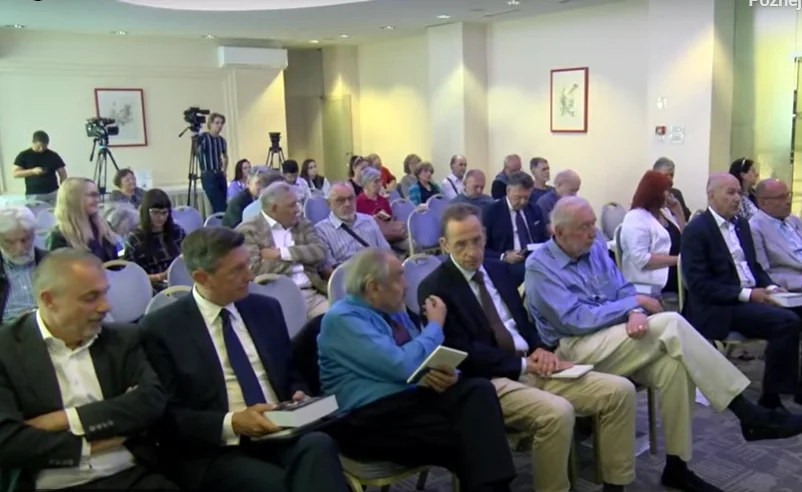The Cathedral of Freedom (Katedrala Svobode) recently organised the inaugural presentation of the collection entitled “Consensus for a Historical Moment” (“Soglasje za zgodovinski trenutek”), which brings together 75 contributions by various authors. The editorial board consisted of distinguished experts, including lawyer and former Constitutional Court judge and Rector of the New University (Nova Univerza) Peter Jambrek, former diplomat Ernest Petrič, historian and publicist Alenka Puhar, politician Janez Janša, former politician and writer Dimitrij Rupel, priest and theologian Ivan Štuhec, former politician and professor Žiga Turk, and the Director of the magazine Nova revija (New Magazine) Tomaž Zalaznik, among many others.
The idea for the collection was thought of last autumn in the context of the Cathedral of Freedom’s narrower committee, where future activities were discussed between September and October 2024. Out of these meetings, the idea of a collection of new contributions to the Slovenian Spring Programme was born, which would serve as the beginning of a new period of reflection and action for the future of Slovenia.
Peter Jambrek pointed out: “‘Consensus for a historic moment’ is reminiscent of the 57th issue of Nova revija, subtitled ‘Contributions to the Slovenian National Programme’. Both publications appeared at key historical moments. The 57th edition of Nova revija heralded the independence and the establishment of the democratic state of Slovenia. Almost forty years later, this collection also marks a turning point.”
He added that the book presents deep and relatively radical solutions, which are not always in line with the current political orientation of the government.
Democracy, ideas and the culture of dialogue
One of the authors, Žiga Turk, warned of the current crisis of quality public debate: “It seems as if we are a dying species in this space. We often mistake quality books for movies that reach more people, but are not of high quality. Democracy is more than an algorithm of likes. It is a contest of ideas, not in the style of performance, but of an in-depth and argumentation. Democracy, which is merely an echo of feelings, becomes vulnerable to cheap populism and moral theatricality that appeals to emotions without responsibility, without action and effort.”

Turk pointed out the dangers of superficial political decisions based on current emotions: “We are a dying species, but we still believe in reason. We believe that democracy is inherently prudent, libertarian, dialogical.”
Main topics and challenges of Slovenia after 1991
The collection highlights the key topics that Slovenia is currently dealing with:
– Unfinished transition and the burden of the past: Despite formal democracy, Slovenia remains a divided society that has not come to terms with the delusions of its past.
– Weak rule of law and systemic corruption: Institutions such as the judiciary, prosecutors and the police are still not functioning effectively, which is linked to an incomplete transition.
– The crisis of values and social polarisation: Lack of trust in political structures and strong ideological divisions hinder cooperation.
– Economic inefficiency and the need for reforms: Excessive dependence of the economy on the state; bureaucratisation, and an inefficient healthcare system are key problems.
– Demographic winter and social challenges: Low birth rates and an ageing population pose a serious challenge.
Suggested solutions:
1. Completion of the transition and national reconciliation based on the truth and ethical horizon of society.
2. Strengthening the rule of law and fighting corruption by introducing a meritocratic system.
3. Comprehensive reforms of the public sector, especially the healthcare and social policy, and reductions in taxes and contributions to promote entrepreneurship.
4. Reform of the educational system that will encourage critical thinking.
Borut Pahor was also among the speakers at the event, who said that Slovenia is at a time when emptiness is felt. “I think it’s time to show new directions. I hope that the general public will reach for the collection and leaf through it,” he said, stressing that Slovenia is not enterprising enough.
Other speakers at the event were Janez Cigler Kralj, who drew attention to the demographic problem, Dr Tina Bergant, who spoke about the preservation of Sloveneness, and Anže Logar, who pointed out that the situation is even more difficult now than it was at the time of the publication of Nova revija 57.
Janez Janša stressed the importance of the title of the collection: “I noticed a change in the subtitle of the current collection and of the 57th edition of Nova revija. The current subtitle is ‘New Contributions to the Slovenian Spring Programme’, not ‘Slovenian National Programme’. This collection has a narrowed ambition, and I think the title should be clear. The ideas are not just political; they are part of the national programme. Slovenia will be better when these ideas are realised.”
He concluded by saying that the Slovenian nation has gone through many trials, it has even been predicted to die out, but there has always been a group of people who have stood up to this. This will also be the case now. “We are at a point of struggle for the truth. We have won the war for Slovenia. But the culture war is still going on. And we must win this war – in accordance with the plebiscite decision of the Slovenians in 1990.”

Dimitrij Rupel concluded the ceremony by stressing the importance of passing on knowledge to the next generation. “The collection includes important topics and messages for those coming after us. It is essential to find new reflections before new wars, which are not far away.”
A. G.


